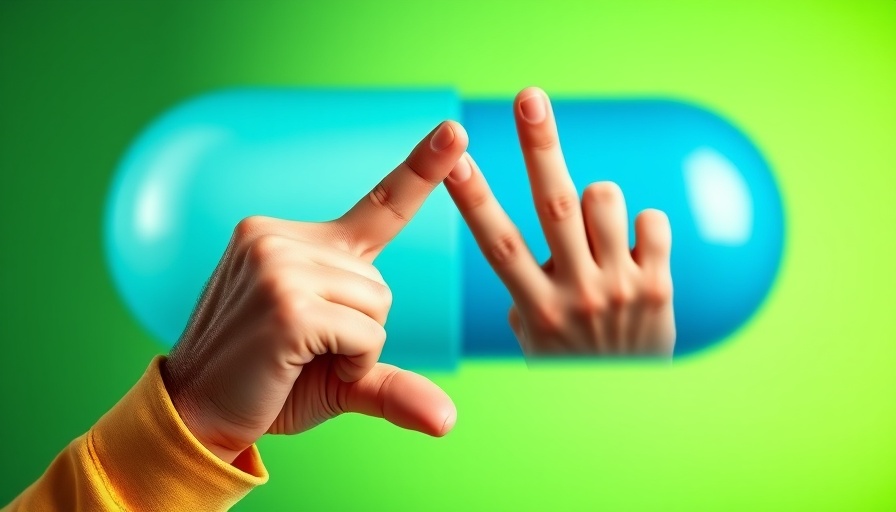
Recognizing the Subtle Signs of Kidney Damage
The kidneys are often overlooked in our pursuit of overall health, yet they play a crucial role in filtering waste and maintaining balance in our bodies. For executives and entrepreneurs juggling high-stress jobs, kidney health can be further compromised due to lifestyles that may neglect adequate hydration, balanced nutrition, and regular medical check-ups. Understanding the warning signs of kidney damage is essential for maintaining your health—not just for longevity but for enhancing productivity and quality of life.
In '7 WARNING SIGNS of Kidney Damage,' the discussion highlights critical indicators of kidney health, prompting us to delve deeper into how they relate to our overall well-being.
Understanding Your Kidneys: The Silent Workers
The kidneys filter approximately 50 gallons of blood daily, removing waste and excess fluid. Unfortunately, these organs do their work quietly, so damage often goes unnoticed until it's significant. High blood pressure, diabetes, and high-stress levels prevalent in executive lifestyles can increase the risk of kidney disease. Knowing the early warning signs can lead to timely interventions to save your kidneys—and your productivity.
Top Warning Signs of Kidney Damage
In the video, "7 WARNING SIGNS of Kidney Damage," several key indicators of kidney issues are mentioned. Here are the salient points to explore:
1. Changes in Urination: Frequent urination, especially at night, or a decrease in urine production can indicate kidney problems. It’s crucial to attune yourself to any unexpected changes in your bathroom habits.
2. Swelling and Water Retention: If you notice puffiness in your ankles, feet, or face, it could be due to the kidneys not eliminating excess fluid efficiently. This is especially important to monitor for busy professionals who might mistake swelling for fatigue.
3. Fatigue and Weakness: A persistent feeling of tiredness could signify the kidneys are not filtering toxins effectively. In high-performing environments, this can lead to mistakes, decreased focus, and poor decision-making.
4. Shortness of Breath: This can be a worrying sign, as it may indicate that fluid is building up in your lungs due to kidney malfunction. Elevated stress might restrain you from acknowledging this symptom, but it’s vital to take it seriously.
5. Nausea and Vomiting: If you frequently experience digestive issues, it may not just be stress-related. These could be signs of your kidneys not flushing out toxins effectively.
6. High Blood Pressure: The kidneys help regulate blood pressure. Monitoring your cardiovascular health is critical, as ignoring hypertension can directly impact kidney health.
7. Changes in Skin Color: Dry, itchy skin could indicate that toxins are accumulating in your body, suggesting your kidneys may be struggling. Productive leaders often want to appear vibrant and composed, making this symptom noteworthy.
The Importance of Regular Check-Ups
For busy executives and entrepreneurs, the idea of regular health check-ups may seem like yet another task on an already overwhelming to-do list. However, prioritizing kidney screenings, especially for those at high risk due to lifestyle factors such as excessive caffeine, alcohol consumption, and sedentary behavior, is critical. Early detection can lead to better outcomes and integrate seamlessly into a proactive approach to health management.
Adapting Lifestyle Choices for Kidney Health
Making practical, everyday adjustments can enhance kidney health significantly. High-stress jobs often lead to high-carb, high-fat meals for convenience. Transitioning to nutrient-dense, hydrating foods like fruits and vegetables can help keep the kidneys functioning optimally. Staying hydrated is essential, not just during work hours but throughout your day—it can improve focus, enhance mood, and help you feel better overall.
Tips for Better Hydration:
- Keep a water bottle on your desk and track your intake.
- Incorporate water-rich foods like cucumbers and watermelon into your snacks.
- Set reminders to take hydration breaks during meetings or calls.
Take Action for Kidney Awareness
Being informed is the first step toward proactive healthcare. By recognizing the warning signs of kidney damage, executives can prioritize their health alongside their workload. If you’ve noticed any of these symptoms or changes in your body, it’s trending toward preventative action to seek professional medical advice.
Conclusion: Empower Yourself with Knowledge
Your kidneys are essential, yet they often go unrecognized until a problem arises. Educating yourself about kidney health empowers you to take ownership of your wellness journey. Addressing these warning signs early not only preserves your kidney function but can enhance your productivity, allowing you to focus on what truly matters—your career and well-being.
Stay proactive about your health. Schedule a kidney health check-up today and embrace a lifestyle that supports your bodily functions, productivity, and future success.
 Add Row
Add Row  Add
Add 




Write A Comment